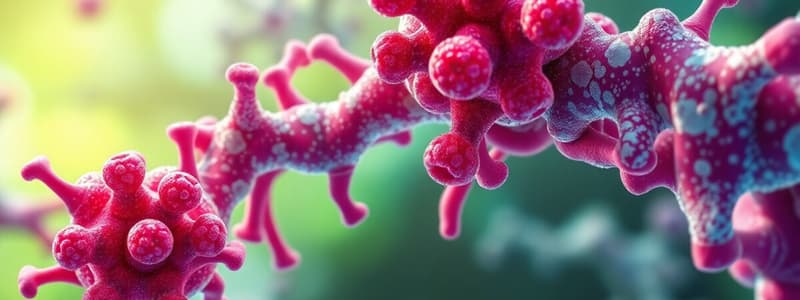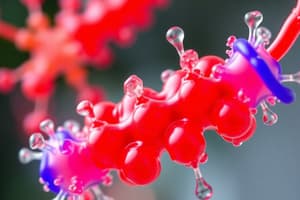Podcast
Questions and Answers
Proteolytic enzymes, also known as ______, are responsible for breaking down proteins.
Proteolytic enzymes, also known as ______, are responsible for breaking down proteins.
proteases
Pepsin is a protease that aids in gastric digestion and is found in ______.
Pepsin is a protease that aids in gastric digestion and is found in ______.
gastric juice
Alcalase is used as an additive to remove ______ stains.
Alcalase is used as an additive to remove ______ stains.
protein
Bromelains, derived from the juice of ______ comosus, are known for their anti-inflammatory properties.
Bromelains, derived from the juice of ______ comosus, are known for their anti-inflammatory properties.
Papain is an enzyme found in raw ______ fruit, which helps in breaking down proteins.
Papain is an enzyme found in raw ______ fruit, which helps in breaking down proteins.
Chymopapain is obtained from the fruit of ______ papaya.
Chymopapain is obtained from the fruit of ______ papaya.
Proteolytic enzymes can help with digestion and may assist in reducing ______ and pain.
Proteolytic enzymes can help with digestion and may assist in reducing ______ and pain.
Enzymes like papain can act as ______ for chill-proof beer.
Enzymes like papain can act as ______ for chill-proof beer.
Pepsinogen is the proenzyme of ______ which gets activated by HCl.
Pepsinogen is the proenzyme of ______ which gets activated by HCl.
One of the digestive enzymes responsible for the digestion of fat is called ______.
One of the digestive enzymes responsible for the digestion of fat is called ______.
______ is used as a laboratory reagent for converting urea to ammonia.
______ is used as a laboratory reagent for converting urea to ammonia.
Collagenase is used to treat severe burns or skin ______ in adults.
Collagenase is used to treat severe burns or skin ______ in adults.
L-asparaginase is used to treat acute lymphoblastic ______.
L-asparaginase is used to treat acute lymphoblastic ______.
______ is used in commercial food production for whitening bread and improving dough handling.
______ is used in commercial food production for whitening bread and improving dough handling.
Enzymes are routinely added to detergents to help remove ______ from fabrics.
Enzymes are routinely added to detergents to help remove ______ from fabrics.
ZYMASE is an enzyme complex that catalyzes glycolysis, the fermentation of sugar into ______ and carbon dioxide.
ZYMASE is an enzyme complex that catalyzes glycolysis, the fermentation of sugar into ______ and carbon dioxide.
EMULSIN contains glycosidases active on beta stereoisomers such as ______ or cellobiose.
EMULSIN contains glycosidases active on beta stereoisomers such as ______ or cellobiose.
MYROSIN is an enzyme occurring in plants of the mustard family that hydrolyzes the glucoside ______.
MYROSIN is an enzyme occurring in plants of the mustard family that hydrolyzes the glucoside ______.
AMYLOGLUCOSIDASE is used for the production of ______ from starch.
AMYLOGLUCOSIDASE is used for the production of ______ from starch.
Cellulase is involved in the preparation of coffee liquid ______.
Cellulase is involved in the preparation of coffee liquid ______.
Lactase prevents lactose ______ in ice cream.
Lactase prevents lactose ______ in ice cream.
PECTINASE is used in fruit juices and wines by enzymatically breaking down the cell ______.
PECTINASE is used in fruit juices and wines by enzymatically breaking down the cell ______.
HYALURONIDASE is a mucolytic enzyme that promotes ______ and hastens absorption of subcutaneous infusions.
HYALURONIDASE is a mucolytic enzyme that promotes ______ and hastens absorption of subcutaneous infusions.
LIPASE hydrolyzes fats into glycerin and ______ acids.
LIPASE hydrolyzes fats into glycerin and ______ acids.
PECTASE is involved in transforming pectin into a more ______ form.
PECTASE is involved in transforming pectin into a more ______ form.
The two most common types of oxidative enzymes are peroxidases and ______.
The two most common types of oxidative enzymes are peroxidases and ______.
Peroxidases are widely distributed in ______.
Peroxidases are widely distributed in ______.
Thrombin is also known as ______ Factor II.
Thrombin is also known as ______ Factor II.
Carbohydrases catalyze reactions that convert carbohydrates into ______.
Carbohydrases catalyze reactions that convert carbohydrates into ______.
Amylase is also referred to as salivary diastase or ______.
Amylase is also referred to as salivary diastase or ______.
Amylopsin is found in the digestive tract of animals and is also called ______ diastase.
Amylopsin is found in the digestive tract of animals and is also called ______ diastase.
Invertase is found in yeast and aids in the hydrolysis of sucrose into ______.
Invertase is found in yeast and aids in the hydrolysis of sucrose into ______.
A major function of thrombin is to convert fibrinogen to ______.
A major function of thrombin is to convert fibrinogen to ______.
Amylase can convert 50 times its weight of potato starch into ______.
Amylase can convert 50 times its weight of potato starch into ______.
Carbohydrases are produced in the pancreas, salivary glands, and ______.
Carbohydrases are produced in the pancreas, salivary glands, and ______.
Chymopapain is injected into the nucleus pulposus to hydrolyze the noncollagenous polypeptides or proteins that maintain the tertiary structure of the ______.
Chymopapain is injected into the nucleus pulposus to hydrolyze the noncollagenous polypeptides or proteins that maintain the tertiary structure of the ______.
Chymopapain relieves lower back pain by lessening osmotic activity and decreasing fluid absorption, which reduces intradiscal ______.
Chymopapain relieves lower back pain by lessening osmotic activity and decreasing fluid absorption, which reduces intradiscal ______.
Trypsin is an enzyme that aids with ______.
Trypsin is an enzyme that aids with ______.
Renin is a coagulating enzyme present in the mucous membrane of the stomach that curdles milk by transforming ______ into insoluble casein.
Renin is a coagulating enzyme present in the mucous membrane of the stomach that curdles milk by transforming ______ into insoluble casein.
Erepsin found in the intestinal juice converts proteoses and peptones into ______.
Erepsin found in the intestinal juice converts proteoses and peptones into ______.
Streptokinase acts to convert plasminogen to ______, which degrades fibrin clots.
Streptokinase acts to convert plasminogen to ______, which degrades fibrin clots.
Urokinase is used for the treatment of ______ within the cardiovascular system.
Urokinase is used for the treatment of ______ within the cardiovascular system.
Fibrinolysin is used for the treatment of pulmonary ______, excluding thrombi of the coronary and cerebral arteries.
Fibrinolysin is used for the treatment of pulmonary ______, excluding thrombi of the coronary and cerebral arteries.
Oxidizing enzymes catalyze an ______ reaction.
Oxidizing enzymes catalyze an ______ reaction.
Sutilains from bacillus subtilis are used for wound ______ and digest soft necrotic tissue composed primarily of denatured collagen.
Sutilains from bacillus subtilis are used for wound ______ and digest soft necrotic tissue composed primarily of denatured collagen.
Flashcards are hidden until you start studying
Study Notes
Enzymes: Types and Applications
- Enzymes are biological catalysts produced by various organisms, crucial for numerous biochemical processes.
Proteolytic Enzymes (Proteases)
- Break down proteins; sourced from animals, plants, fungi, and bacteria.
- Assist with digestion, reduce inflammation, and promote tissue repair.
Examples of Proteolytic Enzymes
- Pepsin:
- Source: Stomach of hogs (Sus scrofa).
- Function: Digests proteins in gastric juice, activating in acidic environments.
- Alcalase:
- An alkaline protease used to remove protein stains.
- Produces protein hydrolysates with improved characteristics.
- Bromelains:
- Derived from pineapple juice; tenderizes meat and reduces inflammation.
- Papain:
- Found in raw papaya; aids in wound healing and skin renewal.
- Chymopapain:
- Extracted from green papaya; used for treating lumbar disc herniation.
- Trypsin:
- A digestive enzyme found in the small intestine, often sourced from livestock.
- Sutilains:
- Derived from Bacillus subtilis; used for wound debridement.
- Rennin:
- Coagulates milk, essential for cheese production.
- Erepsin:
- Converts proteoses and peptones into amino acids in the intestine.
- Streptokinase:
- Treats blood clots by converting plasminogen to plasmin.
- Urokinase and Fibrinolysin:
- Fibrinolysin specifically treats clots, excluding coronary and cerebral arteries.
Oxidizing Enzymes
- Catalyze oxidation reactions, essential for ATP production.
Examples of Oxidizing Enzymes
- Peroxidase:
- Breaks down hydrogen peroxide, aiding in fruit discoloration.
- Thrombin:
- Coagulation factor II, converts fibrinogen into fibrin for clot formation.
Carbohydrase (Amylolytic) Enzymes
- Catalyze reactions converting carbohydrates to simple sugars.
Examples of Carbohydrase Enzymes
- Amylase:
- Digestive enzyme found in saliva, aids in starch breakdown.
- Invertase (Sucrase):
- Hydrolyzes sucrose into glucose and fructose; used in candy production.
- Zymase:
- Catalyzes sugar fermentation into ethanol and carbon dioxide.
- Myrosin:
- Hydrolyzes glucosides in mustard plants; serves as a natural pesticide.
- Cellulase:
- Involved in coffee concentrate preparation.
- Lactase:
- Prevents lactose crystallization in ice cream.
- Pectinase:
- Used in extracting fruit juices and wines.
Esterases
- Hydrolyze ester groups, releasing esterified acids.
Examples of Esterases
- Lipase:
- Breaks down fats into glycerin and fatty acids, enhancing cheese flavor.
- Pectase:
- Converts pectin into a soluble form in ripening fruits.
Other Notable Enzymes
- Collagenase:
- Breaks down collagen, used in treating severe burns and skin ulcers.
- L-Asparaginase:
- Treats acute lymphoblastic leukemia; reduces acrylamide in food processing.
- Lipoxygenase:
- Used in bread-making for flour bleaching and dough handling improvements.
Enzyme Applications
- Used in brewing, baking, cheese production, and detergent formulations for stain removal.
- Enzymes in medicine help in diagnostic tests and the treatment of enzyme deficiencies, such as blood coagulation disorders. They are critical in therapeutic applications for conditions like inherited enzyme deficiencies.
Studying That Suits You
Use AI to generate personalized quizzes and flashcards to suit your learning preferences.




